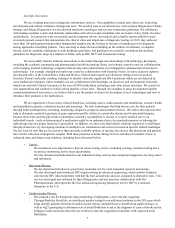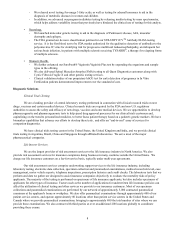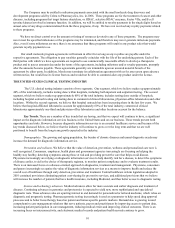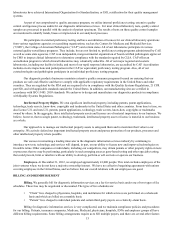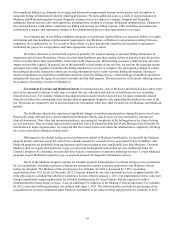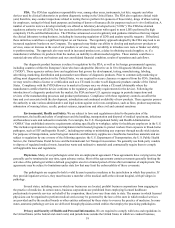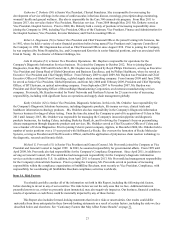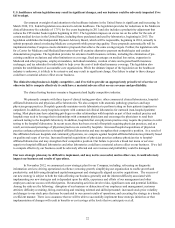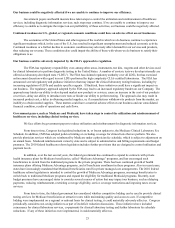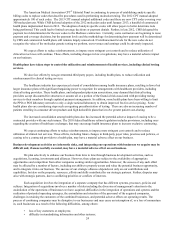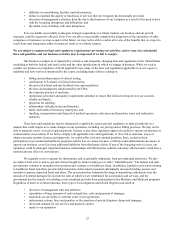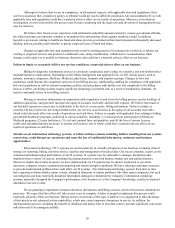Quest Diagnostics 2012 Annual Report Download - page 20
Download and view the complete annual report
Please find page 20 of the 2012 Quest Diagnostics annual report below. You can navigate through the pages in the report by either clicking on the pages listed below, or by using the keyword search tool below to find specific information within the annual report.
17
Medicare Part B
Reimbursements
% of our
2012 Consolidated
Net Revenues From
Continuing
Operations
Clinical Laboratory Fee Schedule 13
Physician Fee Schedule 3
Penalties for violations of laws relating to billing government healthcare programs and for violations of federal and
state fraud and abuse laws include: (1) exclusion from participation in Medicare/Medicaid programs; (2) asset forfeitures; (3)
civil and criminal fines and penalties; and (4) the loss of various licenses, certificates and authorizations necessary to operate
our business. Civil monetary penalties for a wide range of violations may be assessed on a per violation basis. A parallel civil
remedy under the federal False Claims Act provides for penalties on a per violation basis, plus damages of up to three times the
amount claimed.
Historically, most Medicare and Medicaid beneficiaries were covered under the traditional Medicare and Medicaid
programs administered by the federal government. Over the last several years, the federal government has continued to expand
its contracts with private health insurance plans for Medicare beneficiaries and has encouraged such beneficiaries to switch
from the traditional programs to the private programs, called “Medicare Advantage” programs. There has been continued
growth of health insurance plans offering Medicare Advantage programs and of beneficiary enrollment in these plans. In recent
years, in an effort to control costs, states also have increasingly mandated that Medicaid beneficiaries enroll in private managed
care arrangements. The 2010 federal healthcare reform legislation is intended to control the growth of Medicare Advantage
programs, encourage beneficiaries to switch back to traditional Medicare programs and expand the eligibility for traditional
Medicaid programs.
REGULATION
Our businesses are subject to or impacted by extensive and frequently changing laws and regulations in the United
States (at both the federal and state levels) and the other jurisdictions in which we conduct business. These laws and regulations
include regulations particular to our business, and laws and regulations relating to conducting business generally (e.g., export
controls laws, U.S. Foreign Corrupt Practices Act and similar laws of other jurisdictions), including in the United States and in
other jurisdictions. We also are subject to inspections and audits by governmental agencies. Set forth below are highlights of the
key regulatory schemes applicable to our businesses.
CLIA and State Clinical Laboratory Licensing. All of our laboratories and, where applicable, patient service
centers, are licensed and accredited as required by the appropriate federal and state agencies. CLIA regulates virtually all
clinical laboratories by requiring that they be certified by the federal government and comply with various technical,
operational, personnel and quality requirements intended to ensure that the services provided are accurate, reliable and timely.
The cost of compliance with CLIA makes it cost prohibitive for many physicians to operate clinical laboratories in their offices.
However, manufacturers of laboratory equipment and test kits could seek to increase their sales by marketing point-of-care test
equipment to physicians and by selling to both physicians and patients test kits approved by the FDA for home use. Diagnostic
tests approved or cleared by the FDA for home use are automatically deemed to be “waived” tests under CLIA and may be
performed in physician office laboratories with minimal regulatory oversight under CLIA as well as by patients in their homes.
CLIA does not preempt state laws that are more stringent than federal law. State laws may require additional personnel
qualifications, quality control, record maintenance and/or proficiency testing. State laws also may require detailed review of
our scientific validations and technical procedures for tests.
Fraud and Abuse. Federal anti-kickback laws and regulations prohibit making payments or furnishing other benefits
to influence the referral of tests billed to Medicare, Medicaid or certain other federal or state healthcare programs. The penalties
for violation of these laws and regulations may include monetary fines, criminal and civil penalties and/or suspension or
exclusion from participation in Medicare, Medicaid and other federal healthcare programs. Several states have similar laws.
In addition, federal and state anti-self-referral laws generally prohibit Medicare and Medicaid payments for clinical
tests referred by physicians who have a personal investment in, or a compensation arrangement with, the testing laboratory.
Some states also have similar laws that are not limited to Medicare and Medicaid referrals and could also affect investment and
compensation arrangements with physicians.


